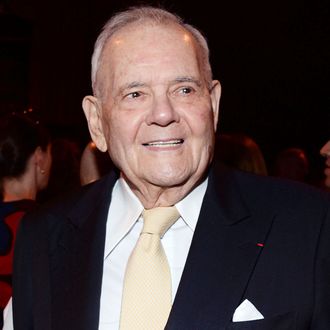
Robert Silvers, the founding editor of the New York Review of Books, died this morning at 87 after battling a brief illness, the New York Times reports.
Silvers created the review in 1963 with the purpose of putting life back into literary criticism, an idea he got after an essay titled ÔÇ£The Decline of Book ReviewingÔÇØ was published by HarperÔÇÖs, where he was an editor at the time. He asked his friend Barbara Epstein if she would join him as co-editor, and the pair brought its premiere issue to life in almost mythic fashion. Silvers explained to New York Magazine in 2013 how he assembled the first contributor roster with the help of Epstein, her husband, and writer Elizabeth Hardwick. ÔÇ£I remember Jason called his friend Wystan Auden. Lizzie called Fred Dupee ÔÇö Lizzie and Barbara both. Lizzie called Mary McCarthy, and so did I. Barbara called Gore Vidal. I called Irving Howe, Alfred Kazin, and Norman Mailer. In the next two days I talked with Jonathan Miller, who wrote on Updike, and then with Philip Rahv, and Dwight MacDonald, who wrote on Arthur Schlesinger.ÔÇØ And so one of the premier literary journals in America was born.
Silvers was born in Mineola, New York, in 1929, and left high school at the age 15 to pursue an accelerated-degree program at the University of Chicago. He briefly studied law before enlisting in the Army in 1950, and remained in Paris working in a variety of publishing jobs until he became the managing editor of The Paris Review. He returned to America in 1958 to oversee literary articles and book reviews for HarperÔÇÖs, where he worked until launching the New York Review. After presiding over the publication for 50 years, Silvers described the journal to New York Magazine in 2013 by saying, ÔÇ£No doubt it has changed in many ways. But the New York Review was and is a unique opportunity, an opportunity to do what one wants on anything in the world. Now, that is given to hardly any editor, anywhere, anytime. There are no strictures, no limits. Nobody saying you canÔÇÖt do something. No subject, no theme, no idea that canÔÇÖt be addressed in-depth. ThereÔÇÖs an infinity of possibilities. Whatever work is involved is minor compared to the opportunity. That is the essence. That is the nature of the magazine.ÔÇØ


